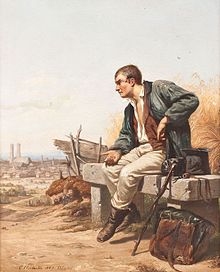Break
A pause (in Middle High German in the 14th century as pūse over old French pause and Latin pausa borrowed from ancient Greek παῦσις paūsis , today's Greek παύση páfsi , rest ',' standstill ') is the temporary interruption of a process.
Different contexts of meaning

Hikers resting in front of Munich , painting by Carl von Häberlin , 1859
- Rest break (also recovery break ): Time in which something rests, does not take place or is not done or interruptions that a person takes for the purpose of short recovery from physically strenuous activity, e.g. B. during sport ( cooling off ), hiking or at work ( work break ).
- School break / class break : time between two lessons .
- Lunch break : Time in which other activities are interrupted in order to have lunch .
- Broadcast break : Time in which radio and television stations do not broadcast any programs . (Also in a figurative sense for “temporarily not in contact with someone”).
- Break in sports: pause within a game (eg. Half the Handball or time between games or) game seasons .
- Summer break from venues or parliaments.
- Winter break from seasonal sports.
- Speaking pause : When speaking , correctly placed pauses are important for understanding and emphasizing what is being said.
- Work break: The temporary rest between work .
- Relationship break : This is understood to mean the short-term break in contact or the temporary termination of intense affections between love partners , with the aim of a more successful new beginning or with the necessary time to think about whether another partnership would make sense.
In theater, concert and cinema
- Break as an interruption to a theater performance or a concert. In many theater and opera performances,one or more pauses are insertedbetween acts provided in the templateor at other dramaturgically meaningful points. Breaks are used to relax the participants and spectators and often also to remodel the set. For the spectators,drinks, often snacks or small meals (“break buffet”)areusually offered for salein the foyer . The break is considered an important part of going to the theater or concert as a social event. In “intermission conversations” the audience exchanges what they have seen so far.
- Intermission as an interruption to a film screening.
In music
- In the music is the musical notation of the period specified in the music or a single voice exposes short. Depending on the length of the pause, different pause characters are used.
- Breathing pause : When singing and playing wind instruments , breathing pauses are necessary (see breathing signs ).
In the medicine
- cardiac breaks in cardiac arrhythmias , e.g. B. Adams-Stokes syndrome .
- Breathing pauses in the event of breathing disorders, e.g. B. Cheyne-Stokes breathing , brief respiratory arrest ("apnea").
In foreign words
As the ending of compound technical terms ( -pause ), it also denotes the end of something in the original Greek sense:
- Menopause : End of female fertility , see also climacteric .
- Tropopause , stratopause , mesopause (boundary layers of the earth's atmosphere).
See also
- Midday rest , siesta
- Pause sign (broadcast)
- time management
Web links
Commons : Pause - collection of pictures, videos and audio files
Commons : Pause (theater) - collection of pictures, videos and audio files
Wiktionary: Pause - explanations of meanings, word origins, synonyms, translations
Wikiquote: Break - Quotes
Wikisource: Pause - Sources and Full Texts
swell
- ↑ Kluge Etymological Dictionary of the German Language , 24th edition.
